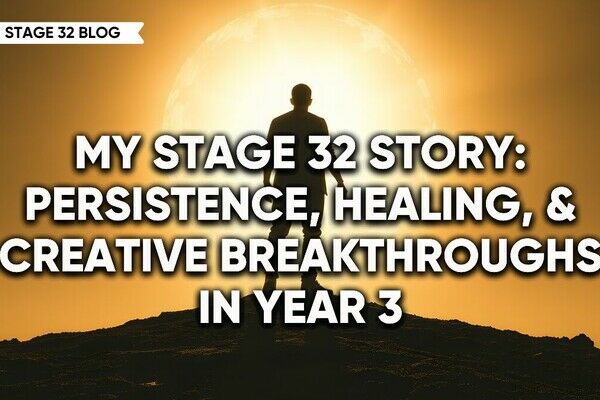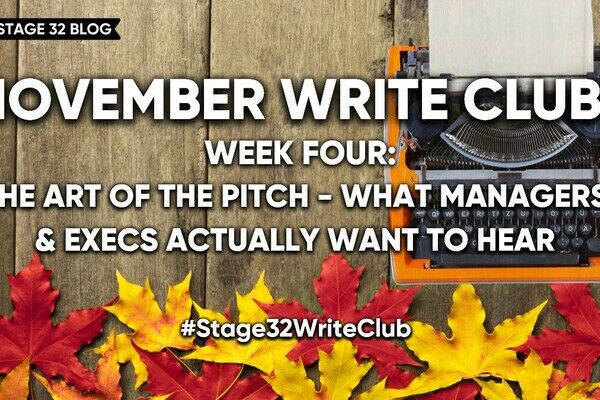Unveiling The Secrets Of Script Analysis
As a follow-up to my previous blog, "Script Analysis 101: Understanding The Key Elements That Make Or Break A Screenplay," today's blog dives further into the intricate world of script analysis. From character development and dialogue to plot structure and theme, this comprehensive guide is designed to empower and inspire new screenwriters as they navigate the complex terrain of script coverage. I hope that this blog will serve as a trusted guide, offering insights and practical techniques to help writers at any level unlock the true potential of their stories.
Script analysis can be the whisper that points a screenwriter toward subtle improvements or the roar that demands significant changes. Its impact cannot be overstated; it's a critical step in refining a screenplay. The analysis shines a light on the strengths and weaknesses within a script, guiding writers to better understand their work.
Join us on this transformative journey as we uncover the secrets of script analysis and empower the next generation of storytellers!

Whispers & Roars: The Impact Of Script Analysis
Script analysis is about more than just fixing errors—it's ultimately about enhancing storytelling. By examining character arcs, plot consistency, and dialogue effectiveness, script analysis provides a roadmap for revisions. This process can transform a good script into a great one, increasing its chances of being sold and resonating with audiences and critics alike. It's the difference between a script that merely sits on a shelf and one that lives on the screen.
It can be an indispensable tool in a screenwriter's arsenal for several reasons!
- It serves as a critical checkpoint before a screenplay reaches the hands of directors, producers, or actors.
- It helps to identify plot holes, bad structure, too many subplots, unnatural dialogue, chaotic mismanagement of themes, unrelated visual imagery, and underdeveloped characters that could otherwise derail a script's success.
- It offers an objective perspective, sometimes revealing issues that a writer might be too close to the project to see.
- It's necessary to ensure that a script aligns with industry standards, which is crucial for new screenwriters aiming to make a professional impression.
- Ultimately, it's about refining the narrative to its purest form, ensuring that every line, every scene, and every character serves the story's purpose and captivates the audience from start to finish.

Exploring the Elements Of Script Analysis
In script analysis, several elements are meticulously examined to assess a screenplay's potential. These elements include structure, pacing, character development, dialogue, and theme.
- Structure is the backbone of the script, ensuring that the story unfolds coherently and compellingly.
- Pacing keeps the audience engaged, with a rhythm that matches the narrative flow.
- Character development is critical; characters must be multi-dimensional and undergo a transformation that intrigues the audience.
- Dialogue must feel authentic and serve the dual purpose of advancing the plot while revealing character traits.
- Theme is the underlying message of the screenplay, the universal truth that resonates with audiences and gives depth to the narrative.
By evaluating these core elements, script analysis helps screenwriters craft a narrative that is not only structurally sound but also emotionally impactful.
Diving Deeper: The Jargon Of Script Analysis
When delving into script analysis, it's essential to understand the specific language used by industry professionals. Terms like "beats," "inciting incident," "denouement," and "act breaks" are part of the script analyst's vocabulary and critical for screenwriters to recognize.
- Beats are the smallest units of storytelling, each marking a significant moment of change.
- The inciting incident is the event that sets the main story in motion.
- The denouement ties up the story's loose ends after the Finale.
- Act breaks define the end of one act and the beginning of another, serving as key structural signposts within the script.
Knowing this jargon is for more than just professional polish; it enables writers to think critically about their work and communicate effectively with others in the industry. This is the language that can turn a script into a cinematic masterpiece.

Enhancing Script Strength: Fundamental Techniques
In practice, certain fundamental techniques are employed.
- One crucial technique is the "read-through," which involves reading the script multiple times, each with a different focus, such as for plot, character, or dialogue. This layered approach helps identify inconsistencies and areas lacking clarity.
- Another technique is "peer feedback," where sharing your script with fellow writers or knowledgeable colleagues can offer fresh perspectives and constructive criticism. Here on Stage 32, you can connect with fellow writers in the Screenwriting Lounge to build relationships and provide peer feedback on each other's work. The Writer's Room also provides opportunities for this type of feedback through the weekly Coverage Report and Writer's Cafes.
- Additionally, "reverse outlining" can be a powerful tool, where you create an outline from the completed script to visualize the story structure and ensure that it's cohesive and compelling.
Implementing these simple techniques allows screenwriters to sharpen their scripts, improving their chances of success in the highly competitive world of screenwriting.
The Innovative Approach: Modern Techniques In Script Analysis
Modern script analysis also embraces innovative techniques that leverage technology and new methodologies.
- One such technique is the use of script analysis software, such as Studio Binder, which can help identify overused words, gauge pacing, and analyze the balance of dialogue versus action.
- Another modern approach is the application of data analytics to predict audience reaction to certain story elements or genres.
- Virtual table reads with actors using video conferencing tools can provide invaluable real-time feedback on dialogue and character interaction. You can even use the Stage 32 Meetups page to share details about your table read with the community and invite others to join in.
- Social media platforms also offer opportunities for beta reading and crowdsourcing feedback, giving screenwriters access to a broader range of opinions.
These modern techniques complement traditional script analysis methods, providing screenwriters with a comprehensive toolkit to refine their work and adapt to the evolving demands of the industry.

Analysis Of Successful Scripts
By breaking down acclaimed screenplays, writers can see firsthand how effective narrative techniques are employed. For instance, Stage 32 is hosting a FREE Webinar to break down the script of the 2024 Academy Award Winning Best Picture, Oppenheimer. You can register for that free webinar HERE or by clicking on the image above.
This type of analysis often reveals a strong opening hook, a well-structured plot, and a satisfying resolution, all of which are hallmarks of successful storytelling. Dialogue in these scripts typically serves multiple purposes, such as advancing the plot and revealing character, and is often sharp and memorable. Successful scripts also demonstrate a keen balance between action and exposition, moving the story forward without bogging down the pace. The themes are woven seamlessly throughout, giving the story depth and resonance.
By studying these scripts, writers learn to emulate the techniques that resonate with audiences and critics.
The Fail Safe: Dissecting Unsuccessful Scripts
Just as much can be learned from unsuccessful scripts as from successful ones. Dissecting scripts that fail to make an impact can reveal common pitfalls to avoid. These may include a lack of clear structure, making it difficult for audiences to follow the story. Unsuccessful scripts often have underdeveloped characters that audiences fail to connect with or care about. Dialogue might be on-the-nose or lack subtlety, failing to sound natural or engaging. Pacing issues, such as slow-moving plots or unnecessary scenes, can also be a common problem, leading to a loss of audience interest.
Dissecting these scripts allows writers to recognize these issues in their work and take proactive steps to avoid them. This process turns potential failures into powerful lessons.

Practical Steps Towards Mastery
Achieving "mastery" in script analysis is a journey that involves continuous learning and practice.
- The best way to begin is by reading a wide range of scripts, both successful and unsuccessful, to understand different writing styles and storytelling techniques.
- Write detailed notes on what works and what doesn't in each script.
- Develop a checklist for your personal analysis that includes key elements like structure, character development, dialogue, pacing, and theme.
- Practice analyzing your own scripts with the same critical eye you would use on others'.
- Seek out workshops, courses, and webinars to learn from professionals and gain different perspectives on script analysis.
- Collaborate with other writers for mutual script feedback to refine your analytical skills.
Remember, every script you read and analyze is a step towards a deeper understanding of the craft.
Final Tips For New Screenwriters
For new screenwriters, the path to success is paved with persistence and openness to learning.
- Always be ready to revise your script; the first draft is just the beginning.
- Embrace constructive criticism and use it to fuel your revisions.
- Understand that script analysis is not a one-time task, but a continuous process that occurs as your script evolves.
- Stay updated with industry trends and audience preferences to keep your writing relevant.
- Network with other writers and industry professionals to gain insights and opportunities.
- Most importantly, believe in your own voice and the story you want to tell!
Your unique perspective is your greatest asset. Keep writing, keep analyzing, and keep improving. Your dedication to the craft can turn your screenplay from a mere concept into a compelling story that captures the hearts and minds of audiences everywhere. Don't give up.
Let's hear your thoughts in the comments below!
Got an idea for a post? Or have you collaborated with Stage 32 members to create a project? We'd love to hear about it. Email Emily at blog@stage32.com and let's get your post published!
Please help support your fellow Stage 32ers by sharing this on social. Check out the social media buttons at the top to share on Instagram @stage32 Twitter @stage32 Facebook @stage32 and LinkedIn @stage-32
| Writer Signs Shopping Agreement With Director & Producer After Connecting Through Stage 32 |
| Want Success in the Entertainment Industry? Start Writing Your Own Narrative |
Search Stage 32 Blog
There are now 4039 blog posts for you to enjoy. Search them all by tags below.
Acting, Advice, Cinematography, Coffee & Content, Composing, Contests, Distribution, Featured, Filmmaking, Financing, Inspirational, Networking, Producing, Screenwriting, Success Stories, Tips, Trending,Relevant Tags
Recommended Articles

My Stage 32 Story: Persistence, Healing, & Creative Breakthroughs in Year 3

Happy Thanksgiving From Stage 32: We Are Thankful For YOU

How to Get Help from Stage 32: Meet the Teams Behind the Scenes

What Stage 32's Community Is Really About (Beyond Scripts, Sets, and Showreels)

Stage 32 Featured at the 43rd Torino Film Festival!

How Stage 32 Script Services Make You A Better Writer

Don't Let the Momentum of November Write Club Die: How to Stay Active Into 2026 & Beyond!

Wearing Many Hats As A Creative

November Write Club Week 4: The Art of the Pitch- What Managers & Execs Actually Want to Hear






